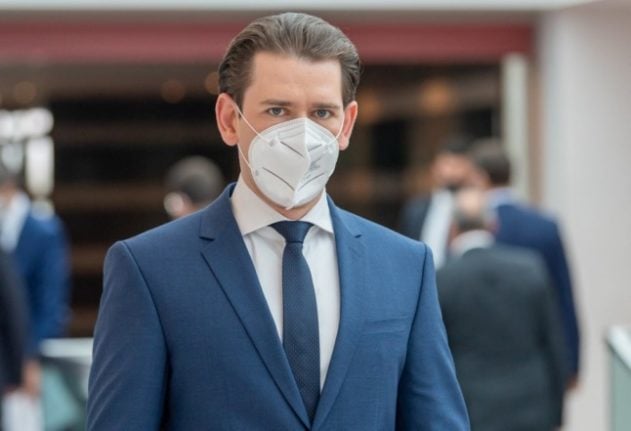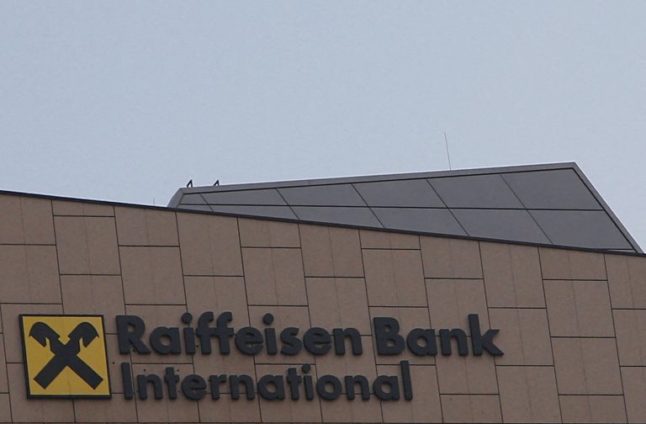It should have been a good month for the 34-year-old conservative — who became the world’s youngest democratically elected leader when he first took
office in 2017 — with the lengthy virus lockdown easing.
But prosecutors announced on Wednesday that they are investigating Kurz for giving false testimony to a committee of lawmakers probing the “Ibiza-gate” scandal and other graft allegations.
READ ALSO: What you need to know about Austria’s ‘Ibiza-gate’ video
If charged, Kurz would be the first chancellor to have to face court while in office in the small Alpine EU member state of some nine million people.
Kurz himself has dismissed the allegations, saying he expects to be charged but not to be found guilty and that he is refusing to step down, slamming what he says are efforts to unseat him.
“I have said nothing that is not truthful,” Kurz told a selected group of Austrian media outlets on Thursday.
‘Kiss’ emoticons
Kurz’s party’s approval ratings already dropped to around 30 percent last month compared to a high of close to 50 percent a year ago.
Austria largely managed to keep the virus at bay during the first wave last year, but has struggled in the third wave with a lockdown since last November.
The investigation compounds Kurz’s troubles as his party’s financing and other practices have also come under the spotlight in recent months.
“It’s the most severe crisis in his chancellorship,” political analyst Thomas Hofer told AFP, adding it has “distracted” from this month’s planned re-opening of restaurants and other leisure venues.
“For Sebastian Kurz, who has been spoiled with success for a long time, it is the most delicate phase of his career,” Die Presse daily wrote in an editorial on Friday.
The investigation announced on Wednesday pertains to statements Kurz gave to a committee of lawmakers last year, in which he denied having had any influence over the appointment of the head of the OeBAG state holding company, Thomas Schmid.
However, in recent months text messages between Kurz and Schmid have come to light, including one exchange where Kurz wrote: “You get everything you
want”, adding several “kiss” emoticons, to which Schmid replied: “I’m so happy :-))) I love my chancellor”.
If found guilty of lying under oath, Kurz could face up to three years in jail.
Kurz already had to step down as chancellor once, in 2019, when his one-and-a-half-year-old coalition with the far-right Freedom Party (FPOe) fell apart because of the so-called “Ibiza-gate” scandal.
FPOe then leader and vice chancellor Heinz-Christian Strache resigned after a secretly filmed video showed him in a luxury villa in Ibiza offering public contracts to a woman he thought was a Russian oligarch’s niece.
In the aftermath, Kurz lost a no-confidence vote in parliament and fresh elections were called, where he managed to secure a strengthened mandate as disillusioned far-right voters flocked to his People’s Party (OeVP).
‘No competitor’
But Kurz’s current junior coalition partner, the Greens, who campaigned on a transparency platform, have been at pains to defend him and his allies hit by allegations of wrongdoing.
In February, the home of OeVP finance minister and Kurz ally Gernot Blümel was raided as part of a probe into possible party financing offences.
READ ALSO: Austrian minister’s home raided in casino corruption probe
“You can see a very heated atmosphere in Austria right now,” Hofer said, adding the current investigation “increases pressure on the Greens a lot”.
On an international level, too, Kurz has frequently had run-ins with other EU leaders.
In the latest row in March, Kurz raised concerns about vaccine distribution within the bloc, saying there had been a lack of transparency surrounding deals between some EU states and vaccine manufacturers.
But analysts point out Kurz’s OeVP is still firmly ahead in the polls.
“Despite the investigations, he overall remains fairly popular as a chancellor,” said Julia Partheymüller of Vienna University’s Centre for Electoral Research.
Another analyst, Peter Hajek, said “on a national level, there is not really any outstanding competitor”.
He added that Kurz could rely on his communication and crisis management skills — at least for now.



 Please whitelist us to continue reading.
Please whitelist us to continue reading.
Member comments